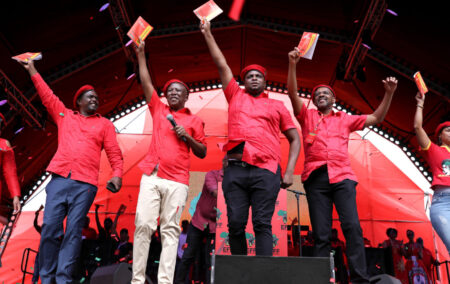It was announced in recent days that the National Prosecuting Authority (NPA) had charged Economic Freedom Fighters (EFF) leader Julius Malema for firing a gun at an Eastern Cape rally in 2018. But discharging a firearm is not the only issue, here.
Both Malema and security official Adriaan Snyman (who appears to hand him the gun in a video of the alleged shooting incident) are being charged. The charges relate, among other things, to the illegal possession of a firearm and ammunition as well as ‘reckless endangerment’ of the people at the rally. What is particularly concerning about the incident is what a gun symbolizes in the context of Malema’s incendiary career. Malema pushes boundaries and seems deliberately to wish to provoke, even to the point of inviting legal action.
Why does he do this? One possible explanation could be the absence of personal repercussions thus far. In 2011, although found guilty of hate speech for singing the ‘Kill the Boer’ song, the conviction carried no significant criminal penalty.
Whether or not there should be legal repercussions to utterances held to be ‘hate speech’, and what these should be, is a hotly debated topic in South Africa, raising the question: how much regulatory power should the state have? Or, as IRR head of media Michael Morris has asked in relation to whether or not abusive comments should be allowed on social media: ‘here is the critical, even worrying, question for defenders of free speech: is less freedom better? By extension, should we defer to global media giants the choice of what we might read and see and, perhaps, be affronted by? And, of course, contest.’
But another court is significant in this instance — the court of public opinion.
As citizens of a country with a history of institutionalised white-on-black discrimination, South Africans have mostly been conscientious about being tolerant, keeping in mind the injustices of the past in responding to what politicians say today. However, in this climate of tolerance, Malema has been cultivating a specific attitude, a climate of stigmatisation against minorities. It appears to be calculated, a continuous pushing of the boundaries. But, of course, they are only words, aren’t they?
Words are powerful. They have played an important role in mobilising people to horrific violence, or at the very least creating tolerance of and complacency about violence. It starts with words – ‘cockroach’, ‘Jewish rat’, ‘Kulak’ or ‘counter-revolutionary’ (in the genocides in Rwanda, Germany, Russia and China respectively). And, as a nation, we seem to have a high-level of tolerance in relation to the words and actions of our political leaders despite government fraud, corruption and the systematic unravelling of South Africa’s infrastructure and economy.
Malema uses words carefully, saying one thing and then muddling it by qualification. For example, he once said the EFF was ‘not calling for the slaughtering of white people‘, adding, ‘at least for now’. He also tweeted: ‘Let them show their true colours, kill them #JUJU,’ but added, appearing to alter the meaning, ‘#Racist don’t want to see us happy and United fellow fighters, let’s kill them with black success. #Asijiki #Kubo #BlackUnity.’ The ambiguity is deliberate, giving Malema a veneer of plausible deniability, while he imparts destructive and angry messages to those who wish to hear them.
The EFF has always employed militaristic imagery and rhetoric. This is evident in the party’s name, uniforms (military berets), and choice of titles. And their leaders seem to purposely mobilise crowds to aggressive protest. Theirs is a politics whose intent seems uncomfortable with institutions, with negotiation and compromise – the stuff of constitutional democracy.
Perhaps now, by using an actual weapon, Malema is deliberately adding to his ‘arsenal’ – to see how much further the boundaries can be pushed. The question is, might his words and gestures presage action?
The views of the writer are not necessarily the views of the IRR.
If you like what you have just read, become a Friend of the IRR if you aren’t already one by SMSing your name to 32823 or clicking here. Each SMS costs R1.’ Terms & Conditions Apply.

